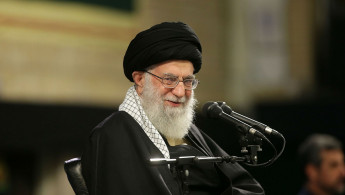Iran's Khamenei rules out talks with US on eve of 40th anniversary of hostage crisis
"Those who see negotiations with the US as the solution to every problem are certainly mistaken," Ayatollah Ali Khamenei said during a speech to mark the anniversary, according to his official website.
"Nothing will come out of talking to the US, because they certainly and definitely won't make any concessions."
On November 4, 1979, less than nine months after the toppling of Iran's American-backed shah, students overran the embassy complex to demand the United States hand over the ousted ruler after he was admitted to a US hospital.
It took a full 444 days for the crisis to end with the release of 52 Americans, but the US broke off diplomatic relations with Iran in 1980 and ties have been frozen ever since.
Khamenei, however, said the Iran-US "disputes" did not start with the embassy takeover.
"It goes back to the 1953 coup, when the U.S. overthrew a national govt. - which had made the mistake of trusting the US - and established its corrupt and puppet govt. in Iran," his Twitter account said in English.
That CIA-organised coup, supported by Britain, toppled the hugely popular prime minister Mohammad Mossadegh who had called for Iran's oil to be nationalised.
The coup reestablished the rule of country's last shah, Mohammad-Reza Pahlavi, who had fled the country in August 1953 after trying to dismiss Mossadegh.
Read more: Iran hopes UN nuclear watchdog will act 'neutrally' under new leader
Tensions have escalated again between Tehran and Washington since US President Donald Trump withdrew from the 2015 Iran nuclear deal last year and reimposed unilateral sanctions.
Khamenei pointed to North Korea's negotiations with the US as a sign of Washington's untrustworthiness, tweeting that "they took photos and praised each other, but the Americans did not lift sanctions even a bit.
"That's how they are in negotiations; they'll say we brought you to your knees and won't make any concessions at the end.”
'Regret'
Just a day before Khamenei’s announcement, one of the Iranian student leaders who was part of the 1979 US embassy takeover in Iran said he now regrets the situation it created and the 444-day hostage crisis that followed.
Speaking ahead of Monday’s 40 anniversary of the attack, Ebrahim Asgharzadeh told the Associated Press that he now understood the repercussions of the seizure even as tensions remain high between Tehran and Washington over the former’s nuclear programme.
Even though the takeover has been enshrined in myth among hard-liners in Iran, Asgharzadeh has cautioned others against following in his footsteps. He also dismissed a revisionist version of the story being spread by supporters of Iran's Revolutionary Guard that they directed the attack, instead insisting that all the blame rested with the students who let the crisis spin out of control.
"Like Jesus Christ, I bear all the sins on my shoulders," Asgharzadeh told AP.
Read more: Iran's FM says new US sanctions show 'maximum failure'
What led to the takeover of the US embassy in 1979 had remained unclear to Americans who could only watch as the hostage crisis continued for months.
Anger in Iran against the United States was rooted in the 1953 CIA-backed coup that toppled the democratically elected prime minister Mossadegh and increased the power of Shah Pahlavi, who was more favourable to American interests.
Months of anger and unrest spread across the country in the lead up to February 1979, when the Shah fled the country seeking medical treatment. This paved the way for the Islamic Revolution.
In this power vacuum, then-President Jimmy Carter allowed Pahlavi to seek medical treatment in New York. That lit the fuse for the events of Nov. 4, 1979, when Iranian students took over the US embassy to try to force Carter to return the Shah to Iran.
Like other former students, Asgharzadeh said the plan had been to simply stage a sit-in. However, it soon spun out of control when Ayatollah Ruhollah Khomeini, the long-exiled Shia cleric whose return to Iran sparked the revolution, gave his support. He would use the popular anger to expand the Islamists' power.
"We, the students, take responsibility for the first 48 hours of the takeover," Asgharzadeh said. "Later, it was out of our hands since the late Supreme Leader Ayatollah Ruhollah Khomeini and the establishment supported it."
"Our plan was one of students, unprofessional and temporary."
Since 1979, Ebrahim Asgharzadeh has become a reformist politician and spent time in prison. He has argued that Iran should work toward improving ties with the US, a difficult task with Trump’s America bent on crippling Iran’s economy.
"It is too difficult to say when the relations between Tehran and Washington can be restored," Asgharzadeh said. "I do not see any prospect."
Follow us on Twitter and Instagram to stay connected





 Follow the Middle East's top stories in English at The New Arab on Google News
Follow the Middle East's top stories in English at The New Arab on Google News


